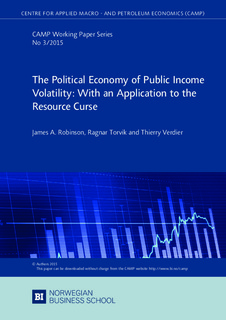The Political Economy of Public Income Volatility: With an Application to the Resource Curse
| dc.contributor.author | Robinson, James A. | |
| dc.contributor.author | Torvik, Ragnar | |
| dc.contributor.author | Verdier, Thierry | |
| dc.date.accessioned | 2015 | |
| dc.date.available | 2015 | |
| dc.date.issued | 2015 | |
| dc.identifier.issn | 1892-2198 | |
| dc.identifier.uri | http://hdl.handle.net/11250/2364621 | |
| dc.description.abstract | We develop a model of the political consequences of public income volatility. As is standard, political incentives create inefficient policies, but we show that making income uncertain creates specific new effects. Future volatility reduces the benefit of being in power, making policy more efficient. Yet at the same time it also reduces the re-election probability of an incumbent and since some of the policy inefficiencies are concentrated in the future, this makes inefficient policy less costly. We show how this model can help think about the connection between volatility and economic growth and in the case where volatility comes from volatile natural resource prices, a characteristic of many developing countries, we show that volatility in itself is a source of inefficient resource extraction. | nb_NO |
| dc.language.iso | eng | nb_NO |
| dc.relation.ispartofseries | CAMP Working Papers Series;3/2015 | |
| dc.subject | Income Volatility | nb_NO |
| dc.subject | Public Policy | nb_NO |
| dc.subject | Politics | nb_NO |
| dc.subject | Resource Extraction | nb_NO |
| dc.title | The Political Economy of Public Income Volatility: With an Application to the Resource Curse | nb_NO |
| dc.type | Working paper | nb_NO |
| dc.source.pagenumber | 36 | nb_NO |
Files in this item
This item appears in the following Collection(s)
-
Centre for Applied Macro- and Petroleum economics (CAMP) [130]
Working Papers from Centre for Applied Macro- and Petroleum economics (CAMP)
